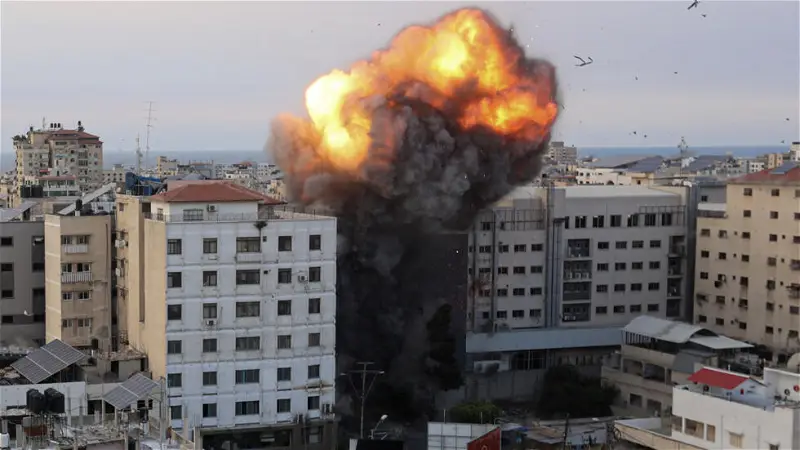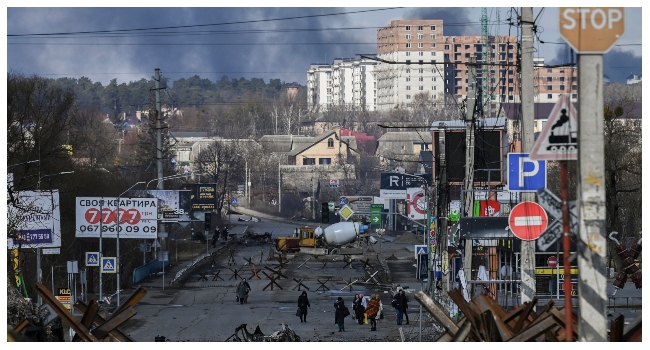
Israeli infantry backed by warplanes mounted an incursion deeper into Gaza, the army said Friday, as it readies for a ground offensive against Hamas for the deadliest attack in the country’s history.
As the conflict raged into its 21st day, there was no letup in Israel’s relentless strikes on the Gaza Strip, with European leaders calling for “humanitarian pauses” to allow in critically needed aid.
Israel has been bombarding the Palestinian territory since Hamas gunmen stormed across the border on October 7, killing 1,400 people, mostly civilians, and kidnapping more than 220 others, according to Israeli officials.
So far, Gaza’s Hamas-run health ministry says the strikes have killed more than 7,000 people, mostly civilians and many of them children, raising growing calls for protection of innocent people caught in the conflict.
With tens of thousands of Israeli troops massed alongside the Gaza border ahead of a widely expected ground offensive, the army said its forces had staged a brief ground incursion into central Gaza.
“During the last day, IDF ground forces, accompanied by IDF fighter jets and UAVs, conducted an additional targeted raid in the central Gaza Strip,” it said in the second such operation in as many days.
Black-and-white footage released by the military showed a column of armoured vehicles as a thick cloud of dust billowed into the sky after the strikes.
Tanks and infantry had staged a similar raid targeting the Islamist Hamas in northern Gaza the previous night, the army said.
As concern spiralled over the fate of the 2.4 million Palestinians trapped under the relentless bombardment, European Union leaders called late Thursday for “continued, rapid, safe and unhindered humanitarian access and aid to reach those in need through all necessary measures including humanitarian corridors and pauses for humanitarian needs”.
‘Our Lives Stopped’
Only 74 trucks of food, water and medicine have been permitted to enter Gaza since the war began in a figure described by aid groups as vastly insufficient.
Before the fighting began, around 500 trucks entered daily, according to the United Nations.
ADVERTISEMENT
Israel has cut supplies of food, water and power to Gaza, and has insisted no fuel can be imported as it could be used by Hamas, which it has vowed to destroy in response to the October 7 attacks.
That has forced 12 of the territory’s 35 hospitals to close, forcing the UN agency for Palestinian refugees UNRWA to “significantly reduce its operations”.
“Without fuel, there will be no humanitarian response, no aid reaching people in need, no electricity for hospitals, no access to clean water, and no availability of bread,” UNRWA Commissioner-General Philippe Lazzarini said.
Israel has won staunch backing from allies including the United States for its military action in Gaza, demanding Hamas release the 224 hostages it snatched on October 7 that include a mix of Israelis and foreign nationals.
The fate of the hostages remains a complicating factor for Israel’s planned ground operation.
Hamas’ armed wing said Thursday that “almost 50” hostages had been killed in the bombardments, in a claim that could not be independently verified.
Four female hostages have been released, but for relatives of those left behind, the anguish continues.
“Our lives stopped,” said Moran Betzer Tayar of the day her nephew and his wife were abducted, telling reporters in Paris she was “worried sick” and desperate to keep the fate of the hostages in the public eye.
‘Wherever We Go, We Will Die’
Inside Gaza, the punishing strikes have left people “with nothing but impossible choices” the UN’s humanitarian coordinator for the occupied Palestinian territory said Thursday.
“Nowhere is safe in Gaza,” said Lynne Hastings as UN figures showed that 1.4 million people — more than half of Gaza’s population — have been displaced by the war.
Israel has repeatedly urged civilians in northern Gaza to move south for their safety, but strikes have also hit southern areas and evacuation routes, Hastings said.
Rahma Saqallah fled south with her family, heeding Israeli warnings. But after strikes killed her husband and three of her children, she was heading back home.
“Wherever we go, we will die,” she told AFP, as she prepared to leave the southern city of Khan Yunis to return to Gaza City with her surviving child.
“They told us to leave for the south and then they killed us (here).”
The situation has been exacerbated by dire medical shortages, with operations now carried out without anaesthetic and ice-cream trucks turned into makeshift morgues.
There are fears the death toll will grow exponentially if Israel launches a ground operation that Prime Minister Benjamin Netanyahu says is being prepared.
Israel faces growing calls to ensure its response does not cause increasing civilian casualties.
“Israel has to do everything in its power, as difficult as it is, to protect innocent civilians,” US President Joe Biden said this week.
AFP


